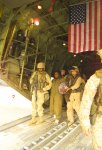Army invites women to try out for elite Ranger school
Im not saying there is a problem in theory. Its fine as long as standards dont change but when has a protected group ever had to meet established standards?
Im not saying there is a problem in theory. Its fine as long as standards dont change but when has a protected group ever had to meet established standards?




